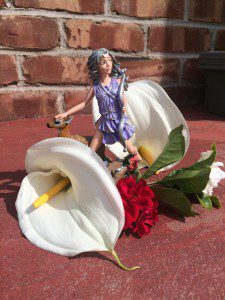Experiencing Eostre
 “Personal gnosis” is sometimes a dirty phrase in the Pagan Blogosphere, but it’s a path I feel is necessary to travel in my own search for Eostre. Last year at the Spring Equinox my coven hosted an open circle for friends and potential new coveners. Since this is something we rarely do my wife and I tried to plan a “big” ritual. There would be a working, frivolity, and a full fledged drawing down the moon. Since it was Ostara we decided to go for broke and invoke Eostre. Given so much of the discussion about this particular goddess in recent years I was unsure what we would get. Would Eostre appear to as a Matron Goddess, or would we get the rather Neo-Pagan Spring Maiden interpretation?
“Personal gnosis” is sometimes a dirty phrase in the Pagan Blogosphere, but it’s a path I feel is necessary to travel in my own search for Eostre. Last year at the Spring Equinox my coven hosted an open circle for friends and potential new coveners. Since this is something we rarely do my wife and I tried to plan a “big” ritual. There would be a working, frivolity, and a full fledged drawing down the moon. Since it was Ostara we decided to go for broke and invoke Eostre. Given so much of the discussion about this particular goddess in recent years I was unsure what we would get. Would Eostre appear to as a Matron Goddess, or would we get the rather Neo-Pagan Spring Maiden interpretation?
We call the Goddess and I watch my wife change before my eyes. The energy in the room becomes different, her walk becomes lighter, her voice a little higher. After a few moments it’s obvious that something much younger in temperament stands before me. The lips of my wife move but the words that come from her mouth belong to someone else, something else, Eostre. She looks around the circle like an extremely self-confident twelve year old, but curious as to why everyone else is staring at her so intently.
After the goddess acclimates to our circle I suggest to her that she receive all of those assembled. We all watch her pause, unsure of what to say (much like any twelve year old might do in such a situation). I see our Lady glance down at the ritual script on the altar and she sighs a bit before saying “I believe you have something for me to read?” I nod in the affirmative and this alien voice that is (and most definitely is not) my wife begins reading my rather lame invocation to be used in case the Goddess doesn’t show up. Watching the reactions of the coven and our guests I notice that they are all just as startled as I am. This is not our High Priestess.
Charge of the Spring
“Ostara is the dawn of Spring, the entry way to Summer. At the Spring Equinox the Earth stands fresh and renewed. Let us all be like the Earth, let us cast away the darkness of Winter and embrace the wonder of green growing things. May we find delight in that which blooms around us and let us never forget our responsibility to this place we call home. This world is magickal place, may the power of our Lady and the beauty of Nature remind us of that everyday we draw breath.”
“Now come forward and receive my blessings. May my touch stir your heart and remind you of the magick and wonder inside us all. These blossoms represent the renewal of the Spring, and the renewal we feel within our Spirit every Spring. Put away your cynicism and doubt and embrace I who am the Mother of Us All. Remember to always rejoice in the small blessings we receive everyday we walk this Earth.”
The words I give the young goddess are changed a little bit of course. The line “may the power of our Lady” is interrupted by a “that would be me, right?” and the words written to represent a deity a bit older in disposition are also changed now and again. When the Lady is finished reading interpreting my words we all take turns bowing to her and she seems to blush (as she glows) at all the attention. After about twenty minutes with us the young Lady says her goodbyes to us and my wife comes back to us.
Post-ritual one of our guests comes up to me and says “last weekend my Heathen group invoked Eostre and she acted exactly like she did tonight.” I tell her that’s good to know and continue to reflect on the experience.
A little while later my wife comes up to me and says “I’m sorry it didn’t work tonight.” I can’t help but laugh a little bit. “Not work? Tonight’s drawing down was amazing!” I tell her and everyone else in the coven agrees.
What does it all mean? I don’t know. I’m bookish enough that I’m always looking for my gods and goddesses in artifacts and ancient stories, but sometimes that’s not enough. I experienced Eostre, and if my modern experience with her doesn’t match up to how she was perceived 2000 years ago, so be it. One of the mysteries of faith is the ability to believe in things that don’t always make sense. Eostre as a goddess doesn’t always make sense, but I don’t doubt the reality of it, then or now.
~Photos of Bede and Eos borrowed from Wikipedia Commons~
*Paschal was another name for the Jewish Passover, which is celebrated on the Friday before the Christian Easter. Eventually “paschal” came to be associated with both holidays.













